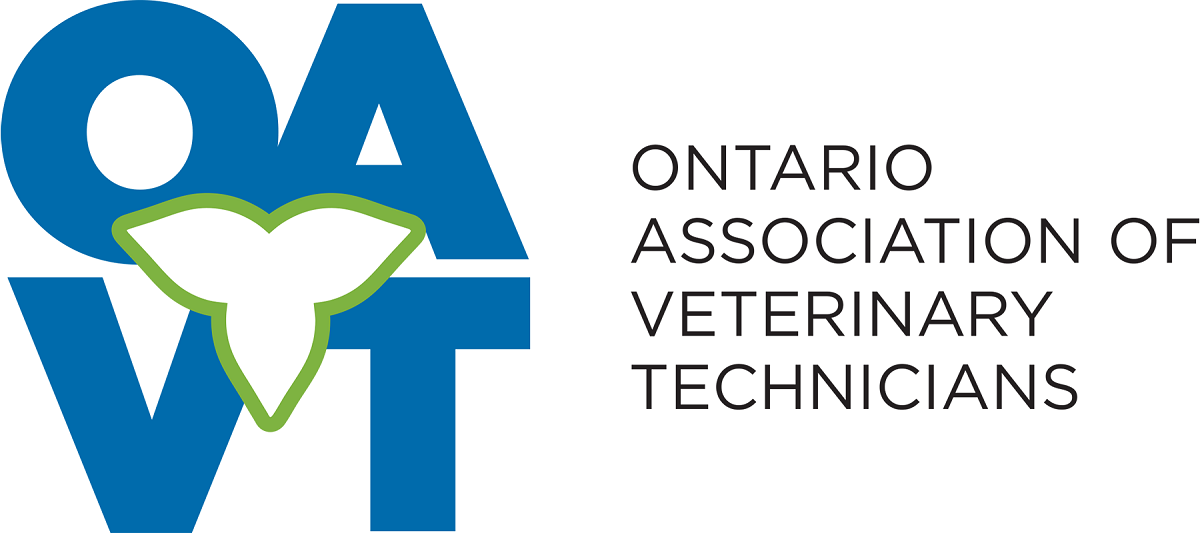ONgoing CE Opportunities
Ongoing CE Opportunities
The postings are categorized and sorted alphabetically for your convenience; they are not displayed in any order of priority or preference by OAVT. New postings are added regularly.
Table of Contents
College Programs/ Certificates/ Diplomas

Are you a registered veterinary technician (RVT) looking to take that next step in your career? Our new Registered Veterinary Technician Micro-Credentials program aims to enhance the existing skills of working RVTs and empower them to take on advanced roles on veterinary healthcare teams.
As the veterinary landscape evolves, these micro-credentials focus on enhancing your role in collaborative care, effective communication, and leadership, ensuring you are pivotal in driving high-quality animal care alongside veterinarians and other team members.
Amidst growing challenges in veterinary access, this program recognizes the expanding opportunities for you to significantly address these gaps. By emphasizing critical areas such as conflict management, team dynamics, client interaction, and integrating new care models, the micro-credentials prepare you to take on enhanced roles, fostering clinical excellence and cultivating positive workplace environments.
In partnership with the Ontario Veterinary College (OVC) and through new funding from the Ontario Government, the program is designed with an eye on future developments in veterinary care, including new legislation and industry trends, ensuring you are not only prepared for current demands but are also positioned to take advantage of future opportunities. This forward-thinking approach positions you as a key contributor in the evolving landscape of veterinary services, empowering you to lead and innovate in response to the changing needs of the profession.
Cost: $300
For micro-credentials focusing on medical content, there are 10 OAVT CE credits available. For micro-credentials focusing on nonmedical content, there are 5 OAVT CE credits available.

This program will teach students the importance of providing an appropriate environment for a wide range of animals in both short and long term rehabilitation situations from an ecological viewpoint. The program will give students a solid foundation on wildlife rehabilitation knowledge, diagnostic and nursing skills gained through practical experience. Graduates will be able to explore a wide range of career opportunities in both the private and public sectors, including employment in natural resources, zoos, and wildlife parks, avian rehabilitation centers, natural bird sanctuaries, orphanage programs and any small or large animal veterinary clinic that receives injured wild animals. Worth 20 CE credits upon completion of program.

Take your veterinary technician skills to the next level with Northern College’s Companion Animal Physical Rehabilitation program.
This one-year Ontario College Graduate Certificate is designed for Veterinary Technician diploma graduates who want to specialize in rehabilitation techniques that enhance the health and well-being of companion animals.
Now delivered through flexible distance learning, this program allows you to gain advanced knowledge and practical skills from anywhere, on your schedule.
PROGRAM HIGHLIGHTS:
Comprehensive Curriculum:
Engage in courses covering therapeutic techniques, advanced anatomy, aquatherapy, and more, all accessible online to fit your schedule.
Practical Application:
Participate in virtual labs and case studies that mirror real-world scenarios, ensuring you’re prepared for clinical settings.
Expert Faculty:
Learn from experienced professionals dedicated to your success and the advancement of animal rehabilitation.
Embark on a rewarding journey to make a tangible difference in the lives of animals. For more information and to apply, visit our program page.
This micro-credential course will go over the basic structure of the swine industry, as well as companion animal swine. The course will cover common diseases, surgeries, and how to handle swine for procedures and sampling.
This course is intended for RVTs who have an interest in swine.
Developed by swine veterinarian Dr. Sue Burlatschenko, who has taught and worked with trusted and valuable Registered Veterinary Technicians who have been critical to the success of her clinic’s pig care services.
Registered Veterinary Technicians have been part of veterinary care (in larger practices) on pig farms for some years now. The Registered Veterinary Technicians’ role evolved as consolidation of both farms and veterinary practices took place.
Today RVTs ‘stand on the shoulders’ of those Registered Veterinary Technicians who supported veterinarians to provide health care to farms. Your role as a member of the veterinary care team on a pig farm has evolved and can now include many new tasks such as blood testing, sample collection, and laboratory work in-clinic, as well as clinical pet pig assistance. The list continues to evolve.
This micro-credential will increase your skills to position you as a very valuable member of the veterinary care team for swine.
The course has been designed to not only deliver information but more importantly designed to provide you with assignments that give you opportunity to perform the tasks and have the confidence to perform your tasks when assigned to you by the herd veterinarian.
This micro-credential is offered online through approximately 60 hours of instruction with farm school assessments over a two-day period with one day in Timmins, and the other in Haileybury, Ontario.
Cost $1500. Through the generous sponsorship of Boehringer-Ingleheim, there are some partial scholarships available to substantially defray costs for the Fall 2025 cohort.
This micro-credential was designed by Dr. Ray Reynan (past President of the Ontario Association of Bovine Practitioners and Canadian Association of Bovine Practitioners) and Wayne Shewfelt (past President of Ontario Association of Bovine Practitioners) and former winner of the prestigious American Association of Bovine Practitioners Dairy Veterinary of the Year Award. Unchanged: This micro-credential was designed by Dr. Ray Reynan (past President of the Ontario Association of Bovine Practitioners and Canadian Association of Bovine Practitioners) and Wayne Shewfelt (past President of Ontario Association of Bovine Practitioners) and former winner of the prestigious American Association of Bovine Practitioners Dairy Veterinary of the Year Award.
Successful candidates will be able to function independently and confidently as part of a veterinary service delivery team.
These micro-credentials are offered online with farm school assessments in Haileybury, Ontario or other locations. Micro-credentials are an ideal option for achieving badges of completion for professional development that can also be placed in LinkedIn accounts.
Modules include:
- Stockmanship
- Dairy Industry
- Life of a Diary Cow
- Udder Health/Milk Quality and Mastitis
- Reproduction/Manipulation of Cycles and Breeding
- Nutrition
- Transition Cow Management
- Dairy Software
- Dairy Medications
- Health Management
- Hoof Health and Lameness
Cost $1500
This micro-credential course will equip the graduate with the skills necessary to establish an effective calf health and monitoring program within a veterinary practice. Developed by leading dairy researcher Dr. Dave Renaud, with contributions from practicing dairy veterinarians Drs. Kristen Edwards and Lance Males, this program is intended for RVT’s or VT’s who have an interest in dairy calves.
Course Content
The material covers:
- Calving and colostrum management
- Evaluating feeding equipment cleanliness (luminometer) and failure of passive transfer
- Calf housing and environmental assessment
- Pre-weaning nutrition
- Weaning management
- Common neonatal diseases
- Routine castration and disbudding
- Performing on-farm necropsies
- Reinforcement of an organized approach to investigating disease outbreaks in a calf health scenario
The ability to regularly chart heifer growth as well as health parameters/disease incidence will prepare the technician to immediately establish these monitoring programs within their practice. Lung ultrasonography is also covered.
This micro-credential is offered online through approximately 60 hours of instruction. It also requires a placement of approximately 40 hours in a dairy practice to perform many of the essential skills necessary, as well as a 2-day “farm school” assessment in Haileybury, Ontario.
Cost TBD, Program enrollment available for fall 2025.
To Register: NCMicro@northern.on.ca
This micro-credential course will cover the basic structure of the beef cattle industry in Ontario and was designed to take advantage of the recent changes to the Veterinarians Act. Common diseases, cattle handling, and hands on performance of technical procedures and sampling form the basis of material. This course is intended for RVTs who have an interest in beef cattle.
This micro-credential was designed by Gabriel Jantzi, the 2023-24 President of the Ontario Association of Bovine Practitioners and a practicing veterinarian with Metzger Veterinary Services in Chelsey, Ontario.
Successful candidates will be able to function independently and confidently as part of a veterinary service delivery team.
These micro-credentials are offered online through approximately 60 hours of instruction and 2 ½ day in-person farm school assessments in Haileybury, Ontario.
Cost: $1500

Explore the interdisciplinary approach of One Health and its profound implications for addressing complex challenges at the intersection of human, animal, and environmental health. Delve into the foundational principles and practical applications of One Health, and become equipped with the essential knowledge and skills to navigate contemporary health issues in an interconnected world.
Through a blend of engaging content, interactive discussions, authentic case studies, and collaborative projects, you will deepen your understanding of One Health as a transformative approach to current challenges involving environmental, human, and animal health. Guest speakers from various disciplines will provide real-world perspectives, enriching discussions on interdisciplinary collaboration, and ethical considerations in One Health practice.
Learning Outcomes
Upon successful completion of this course, you will be able to:
- Explain the core principles, key conceptual components, and value of the One Health approach
- Discuss the links and inter-dependencies of human, animal and environmental health problems
- Use complexity maps, systems thinking, and interconnectivity to understand complex health problems through a One Health approach
- Integrate diverse perspectives, disciplines, and agencies to propose innovative solutions to complex health challenges
- Collaborate with peers to problem solve and formulate actionable strategies for operationalizing One Health approaches in practical settings
- Reflect on the ethical implications and professional responsibilities inherent in One Health practice
Course Topics:
Introducing One Health and Its Approach
Complexity and Problem Solving in One Health
Interactions, Imbalances, and Human Roles within Complex Problems
The Importance of Multiple Perspectives, Communities, and Social Science
Networks and Interconnectivity in One Health
Operationalizing One Health
Tuition: $995

Designed specifically for you and your organization, learn to elevate communication and leadership skills to support transformative change in veterinary care. By focusing on relationship-centered veterinary medicine, you will learn to enhance team function and client interactions, crucial for addressing the evolving demands of the field. Emphasize the higher purpose of fostering a compassionate, inclusive veterinary environment and the evolving role of registered veterinary technicians, building trust, managing conflict and promoting mutual respect. Learn to implement relationship-centred veterinary medicine and use effective communication tools to improve team function and client interactions. Critical aspects of leadership and followership roles, regulatory landscape, and creating a psychologically safe workplace to prevent burnout and compassion fatigue are also covered. Through practical applications, you will develop the confidence to lead and collaborate effectively, positioning yourself to tackle current challenges and future opportunities in veterinary practice. This preparation ensures that you are equipped to deliver high-quality care, drive innovation, and contribute to the success of your practice, ultimately enhancing access and advancing the future of veterinary services.
Learning Outcomes
Upon successful completion of this course, you will be able to:
- Describe the regulatory environment for registered veterinary technicians, including authorized activities and co-accountability for delivering services and care in a veterinary team
- Articulate ways to implement the principles of relationship-centred veterinary medicine in an RVT-led context
- Employ strategies to enhance veterinary team performance, including building trust, effective communication, giving and receiving feedback, managing conflict, and enhancing mutual respect
- Develop strategies to foster a workplace environment that promotes psychological safety, manages conflict effectively, and drives cultural change. 5. Articulate ways to advocate for expanded RVT participation in clinic leadership and client care
Course Topics
- Understanding of Different Workplace Personality Types and Their Communication Styles
- Difficult Interactions/Conversations (conflict management) – Strategies for Navigating Conflict Management
- Review Communication Technologies and Their Use in the Veterinary Setting
- Burnout
- DEIA/Inherent Biases
- Emotional IQ
- Compassion Fatigue
- QPR – Question, Persuade, Refer
- RVT Regulations
- Utilization of Team Members
Tuition: $300
Book a seminar/Lunch & Learn or in-person course

CANINE ATTENDANT TRAINING
LECTURE HOURS: 5.5
PRACTICAL HOURS: 1.5
Canine Behaviour and Safety: Promoting Positive Interactions and Conflict Resolution
Safe, positive, and healthy human-to-dog interactions begin with understanding and effectively communicating in the dog’s language. This comprehensive full-day course is specifically designed for veterinary technicians, kennel attendants, doggy daycare staff, professional dog walkers, and other animal care professionals. It is structured into three main components: Canine Behaviour, Dog-to-Dog Reactivity, and Canine Self-Defense.
Throughout the day, participants will develop the essential skill of reading canine body language and vocalizations, which are vital for understanding a dog’s emotional state in various situations. By learning to recognize subtle cues, participants will be equipped to accurately assess signs of stress, fear, aggression, and relaxation. This foundational knowledge will enable them to respond appropriately to the dog’s needs, ensuring that their actions promote safety and comfort for both the animal and handler.
The course will delve into the nuances of canine communication, helping participants differentiate between signs suggesting comfort and those indicating discomfort or potential aggression. Emphasis will be placed on how to adjust one’s approach based on these observations—whether that involves providing more space, changing the environment, or using calming techniques to help a dog de-escalate. Participants will also learn how to anticipate a dog’s next move by understanding how certain behaviours may escalate or de-escalate in real time, allowing them to diffuse potentially stressful or dangerous situations before they escalate into conflicts.
A key portion of the course, Canine Self-Defense, provides participants with practical skills for safely managing high-risk situations. This includes techniques for defusing an agitated dog, safely intervening in dog fights, and protecting oneself in the rare event of an aggressive attack. By the end of the course, attendees will be empowered with the knowledge and confidence to ensure both their own safety and the well-being of the dogs they work with.
Topics to be covered include:
- How to read canine body language
- Understanding vocal communication
- Typical breed group dispositions
- Human to canine communication
- Identifying and categorizing types of dog reactivity
- How to defuse antagonistic behaviour displays
- How to safely break up a dog fight
- Quickly assessing the intentions of an approaching dog
- Avoiding errors when being approached by a hostile dog
- Defusing displays of aggression directed towards you
- Protecting yourself in the event an attack becomes unavoidable

CANINE BASIC HANDLING
LECTURE HOURS: 3.5
PRACTICAL HOURS: 3.5
LEARNED OUTCOMES
Canine Basic Handling for Kennel Attendants & Animal Care Providers
This comprehensive course is designed for Kennel Attendants, Animal Care Providers, and anyone working with dogs in kennel environments. It provides both the theoretical foundation and hands-on practical experience necessary for promoting safe, humane, and effective interactions with dogs. The course covers key behavioural principles and practical techniques that empower participants to handle dogs confidently and compassionately in a kennel setting.
In the theoretical section, participants will learn how to observe and identify repeat behaviour patterns, spot signs of distress or emotional decline, and implement strategies to reduce trigger stacking. The goal is to develop skills in establishing antecedent control—preventing undesirable behaviours before they occur—and ensuring that interactions with dogs remain positive and safe for both the animal and the handler.
On the practical side, participants will practice introducing themselves to new dogs in a polite and respectful manner, building rapport to establish trust and a sense of safety for the animal. They will also learn leash handling techniques, how to troubleshoot overstimulation or sensory overload, and how to boost their own confidence in handling dogs. All of these skills are taught using Least Intrusive, Minimally Aversive (LIMA) methods, in alignment with the CCPDT Humane Hierarchy, ensuring that dogs are managed with compassion and respect.
The course includes hands-on experience in a real kennel environment, allowing participants to fine-tune their skills under the guidance of Canine Foundations’ IAABC Certified Behaviour Consultants. With a low instructor-to-student ratio, participants receive personalized coaching to enhance their ability to assess compatibility with current clients in daycare, walking, and other care environments. By the end of the course, attendees will be equipped with the confidence and skills needed to ensure safe, positive interactions with dogs in their care.
Topics to be covered include:
- Successful Introduction Methods
- Identifying emotional Shifts
- Defuse Emotionally Charged Situations
- Minimally Intrusive Kennel Extractions
- Utilizing Basic Training Equipment
- Safe Canine Handling Practices
- Defensive Leash Handling Skills
- Loose Leash Walking
For a list of available dates for this in-person course, please click on https://www.caninefoundations.com/mleo-animal-shelter-continuing-education/canine-basic-handling/

CANINE FOUNDATIONS’ TRAINING ACADEMY
September 8, 2025, to May 31, 2026
Course Description
The Certification Council for Professional Dog Trainers (CCPDT) is the leading independent testing and certification resource for dog training and behaviour professionals. They set the global standard for the development of rigorous exams to demonstrate mastery of humane, science-based dog training practices, and are the leading international regulatory body for the industry. Canine Foundations Training Academy provides students with the knowledge and practical experience required to qualify for the CCPDT Knowledge Assessed exam, pass their rigorous standards for knowledge and skills in science-based dog training, and achieve CPDT-KA certification. The course outline is specifically developed to cater to the demanding schedule of professionals, providing them with the ability to achieve their educational goals while maintaining their current full-time job.
Learning Objectives
This course will provide students with a broad range of knowledge in canine ethology, husbandry, learning theory, training technique, equipment, and client instruction/communication skills, to prepare them for the CCPDT Knowledge Assessed exam. Throughout the course, students will gain hours of practical experience required to qualify for the CCPDT- KA Exam, in both a group and private virtual training settings, under the guidance of a CCPDT Certified Dog Trainer. The objective of this course is to encourage standardization within the Canadian Dog Training industry by supporting professionals in achieving a higher level of accreditation, demonstrating their knowledge base and separating themselves from their competition.
Career Opportunities
Graduates will find a range of opportunities as a certified member of the Certification Council for Professional Dog Trainers, including employment with group, competitive and private obedience training companies, the service dog industry, board and train facilities, animal shelters/rescue organizations, veterinary clinics, daycare facilities and breeding programs, or, launching their own training company.
Program Overview
This fully virtual program is designed for those aspiring to become ethical dog trainers, grounded in the most current science and best practices in the field. Through flexible scheduling and comprehensive content, this course prepares students to work with dogs and owners using humane, science-based methods. The links for each day of classes are emailed to students’ Georgian College email addresses 24 hours in advance of the scheduled session.
The course is structured to accommodate the professional needs of those balancing work and study. The first two weeks will involve a full-time classroom commitment, of Monday to Friday, 9am to 5pm, followed by a more flexible schedule requiring attendance for one weekend (both Saturday and Sunday) per month for the remainder of the program.
Throughout the course, you will cover foundational knowledge, essential skills, and advanced techniques to build your expertise as an ethical dog trainer. Core topics include canine behaviour, communication, learning theory, training techniques, and more. By the end of the program, you will be well-equipped to develop and implement effective training plans, manage group classes, and address a wide range of canine behaviour challenges.
Topics to be covered include:
- Ethology & Development
- Communication & Breeds
- Canine Emergency First Aid
- Learning Theory
- Ethical Training & Equipment
- Customer Relations
- Group Class Management
- Safety Protocols
- Record Keeping
- Training Plan Development & Techniques
- Instructional Skills
- Canine Nutrition & Husbandry
- Canine Behaviour Challenges
- Advanced Training Techniques
- Class Practical Sessions
Practical Class Structure
To enhance the learning experience, our Instructional Skills and Real-Class Practical sessions are designed to divide the overall class into smaller groups of 5 to 6 students per instructor. This format allows for more personalized attention and maximizes hands-on practice, ensuring students have ample opportunity to fine-tune their techniques in a supportive environment.
Each student will be assigned a specific Behaviour Consultant, who will also serve as their Education Consultant throughout the practical sessions. Students will receive a WebEx invitation from their assigned Behaviour Consultant for the smaller group sessions, ensuring seamless access to each class.
Every practical class follows a consistent structure to optimize learning. The session begins with a professional breakdown of the cue being covered, followed by a live demonstration from the instructor. During the demonstration, students are encouraged to ask questions and clarify key concepts.
After the demonstration, each student is provided the opportunity to practice the skill themselves, allowing for hands-on refinement under the guidance of the instructor. Students will also practice teaching the cue to another peer, gaining valuable experience in both applying and instructing the technique.
This interactive, hands-on approach ensures that participants not only grasp the theory behind each technique but also gain the confidence and proficiency needed to apply them effectively in real-world training scenarios.
CCPDT Practical Experience hours
To qualify for the CCPDT-KA exam, students are required to complete 225 hours of practical experience, specifically in training human handlers to work with their dogs. These hours must be CCPDT-approved and can be fulfilled through weekly training sessions of 1 hour each, over the course of 9 weeks.
Students are encouraged to start this process by working with family, friends, or neighbours to fulfil these hours, provided they maintain a consistent training schedule of one session per week. This portion of the Academy is designed to be flexible, allowing students to complete their practical experience at their own pace, in a way that fits their schedule. Students are encouraged to arrange and book their own training sessions with their clients, ensuring that the timing works for both parties.
For those who are unable to arrange the necessary 6 client dogs per week to complete the 225 hours, Canine Foundations offers a Referral Placement service. This option connects students with pre-arranged placement locations, such as canine rescues, animal shelters, veterinary clinics, doggy daycares, and Canadian Kennel Club breeders. These organizations are eager to provide students with a list of client referrals.
Given the virtual nature of this course, students are expected to use an online platform to complete their Referral Placement and CCPDT Practical Experience Hours. While many students and clients prefer platforms such as WebEx, Zoom, and Microsoft Teams, you are free to use the platform you are most comfortable with, as long as it supports clear communication and effective training.
Student Support
In addition to each student having full access to Georgian College IT Support, students are assigned a Mentor Consultant. Your Mentor Consultant will be assigned by the end of the first week and will facilitate smaller group classes for each of the Instructional Skills Practical and Real Class Practical classes listed in your schedule. Your Mentor Consultant is available to you via email from Monday to Friday to answer any questions you may have regarding homework assignments and problem shooting training programs with your Referral Placement clients.
Time Commitment Overview
The program is designed to be completed within 10 months, from September to June. Students can choose to complete the course in a more flexible two-year span if needed.
Standard 10-Month Schedule:
- Course Duration: 10 months (Students have up to June to submit all assignments).
- Virtual Classroom: The course begins with 2 weeks of live virtual classes, held Monday to Friday, from 9:00 AM to 5:00 PM.
- Post-Classroom Schedule: After the initial 2 weeks, students attend one weekend webinar per month (both Saturday and Sunday, 9:00 AM to 5:00 PM).
- Practical Training Classes: The 8 Virtual Practical Training Classes are integrated into the weekend webinars, so no additional time is required for these.
Practical Experience Hours:
- 225 CCPDT Practical Experience Hours: Students will accumulate approximately 6 hours per week over the course of the program. These hours can be scheduled at the student’s convenience, allowing flexibility to work with family, friends, or clients.
Homework & Independent Study:
- Homework Assignments: There are 10 homework assignments, plus one extra-credit option. These will require approximately 1 hour per week.
- Independent Study Unit: A final Independent Study Unit, due at the end of the program, requires approximately 20 hours to complete.
Weekly Commitment (Post-Initial 2 Weeks):
- After the initial 2-week classroom period, students can expect to spend approximately 7-8 hours per week. This includes:
- 6 hours of practical experience (training clients).
- 1 hour of homework.
- 2 full days (16 hours) of class per month (the weekend webinars).
Option for a 2-Year Completion:
- Year 1: Focus on attending classes and completing homework assignments, which reduces the weekly time demand to about 1 hour per week (plus the two 8-hour classes per month).
- Year 2: Focus on accumulating practical experience hours, reducing the time commitment to approximately 6 hours per week (with no class attendance in Year 2).
CCPDT Exam Information:
- The CCPDT exam is held twice a year, in fall and spring. Students are encouraged to sit for the exam in the fall (September or October), with applications typically due by the end of July.
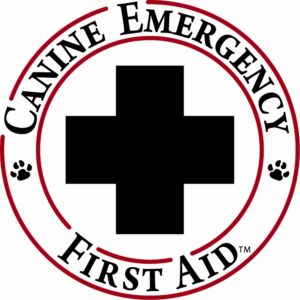
CEFA – CANINE EMERGENCY FIRST AID
LECTURE HOURS: 4.5
HANDS-ON HOURS: 3.5
Certified Canine Emergency First Aid: Lifesaving Skills for Dog Owners and Professionals
This comprehensive, full-day Certified Canine Emergency First Aid course is tailored for individuals who work with dogs, including dog owners, trainers, behaviour consultants, veterinary professionals, and animal care workers. The course provides participants with crucial knowledge and hands-on experience to respond confidently and effectively during canine emergencies. It has been evaluated and highly recommended by numerous veterinarians, making it an essential lifesaving resource for anyone responsible for a dog’s welfare.
Participants will learn how to recognize and assess common injuries and illnesses in their early stages, allowing them to respond swiftly and accurately before professional medical help is available. The course covers a wide range of emergency situations, from choking and bleeding to seizures and heatstroke, ensuring that attendees are prepared to handle various scenarios with competence and care. In addition to early recognition, the course emphasizes the proper techniques for performing first aid, stabilizing the dog, and improving the likelihood of survival during transport to a veterinary clinic.
A key component of this course is the hands-on practice. Participants will work with both a live, trained seminar dog and a CPR dog mannequin, allowing them to practice critical first aid techniques such as CPR, wound care, and bandaging under realistic conditions. This hands-on experience ensures that attendees can apply the skills in real-life emergencies with confidence.
Upon completion of the course, participants will receive a Canine Emergency First Aid certification, demonstrating their preparedness to act in emergency situations and assist a dog in need.
Topics covered include:
Morning – Professional First Aid
- Recognizing signs of pain and distress
- Common Canine diseases
- Head to tail assessment
- Poison response
- Major and minor burns
- Hyperthermia response
- Hypothermia response
Afternoon – Trauma Response
- Muzzling and restraint
- How to read your dog’s vitals
- Bleeding and bandaging
- Impalements
- Broken bones and splints
- Shock management
- Safe emergency transport
- Canine Heimlich maneuver
- Canine CPR
The target audience for this course includes; Animal Control Officers, Cruelty Investigators, Canine Handlers, Shelter workers, Veterinarian Technicians, Dog trainers & Behavioural Consultants, Breeders, Groomers, Doggy Daycare Attendants, Dog Walkers / Pet Sitters, Foster Parents for Canine Rescue groups and the average dog owner.

Compassionate End-of-Life Care Communication Strategies
Learning outcomes:
- Develop an understanding of how to convey compassion as you communicate with a grieving family.
- Learn how judging a family’s decision for End-of-Life Care creates communication barriers and increases the care providers risk for burden transfer and burnout.
- Learn the do’s and don’ts of End-of-Life Care Communication
- Explore the role body language plays in EOL Care communication and learn the do’s and don’ts of body language
- Develop strategies for navigating End-of-Life Care communication challenges
Take away: The best gift you can give a grieving family is learning how to be a compassionate communicator. The best gift you can give yourself as an EOL care provider is learning not to judge the family’s decision.
Introduction: a bit about who we are and what we do
Why a good death matters – we talk about the four steps to creating a meaningful experience using the acronym CARE.
Discover the important role that compassionate communication plays in providing a meaningful experience
Learn how judging the family’s decision impacts our ability to be compassionate communicators as well as our own wellbeing. Develop an understanding of the unique set of “budgets” that each family has that impacts their timing.
Learn the dos and don’ts of End-of-Life Care communication.
Learn the role that body language plays and the dos and don’ts of body language.
Explore other non verbal ways to communicate warmth and compassion.
Navigating Communication Challenges- 4 common communication challenges and strategies to help (silent family, the ‘rushy’ family, family not on the same page, family with children).
Answering tough questions: review a few of the tough questions we get asked as End-of-Life Care Providers and learn strategies to reply with grace and compassion.
To schedule a training session: endoflifecaretraining@gmail.com

An interactive seminar presentation brought to you!
Description: Bring interactive and essential training to your veterinary clinic with the RVT Approach’s In-Clinic Workshop. This seminar covers choking, basic and advanced life support, as well as post-resuscitative care. Our hands-on training session with Casper, the CPR mannequin, ensures that your team is equipped with the knowledge and skills needed to provide the best care possible.
Email: keljohnson31@gmail.com
Phone: (905) 467-8807
Website: www.rvtapproach.com


Discover the modern expectations families have for their pets’ end-of-life care experience, along with the latest protocols and techniques for achieving a meaningful transition. This Lunch and Learn also offers your team valuable resources to support the patient, the family, and the care provider.
– Review how the human-animal bond has evolved over the centuries
– Discuss modern expectations that families have for their pet’s end-of-life care
– Learn the steps to creating a meaningful experience using the acronym CARE
– Review examples of sedation protocols
– Discuss common reasons you may need to deviate from sedation protocol
– Discuss strategies for navigating challenges
– Review tips for transforming the exam room
– Discover the importance of providing grieving resources to all families
Cost: $499 for up to 5 team members; $30 per additional member (virtual). In-person events include a travel fee of $0.60/km round trip.

Discover your unique strengths and how to leverage them for optimal performance in your personal and professional life. This program includes an asynchronous psychometric evaluation of your strengths, a detailed report, a presentation of the importance of strengths through the lens of positive psychology, as well as one-on-one coaching to specifically address your report and what it means for you. You’ll walk away knowing what makes you unique, how to mitigate challenges and how to use your strengths to be your best self.
20% off the regular price of $250 (RVT Special!)
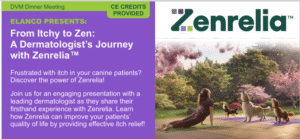
From Itchy to Zen: A Dermatologist’s Journey with Zenrelia™
ELANCO PRESENTS: From Itchy to Zen: A Dermatologist’s Journey with Zenrelia™
Frustrated with itch in your canine patients? Discover the power of Zenrelia! Join us for an engaging presentation with a leading dermatologist as they share their first hand experience with Zenrelia. Learn how Zenrelia can improve your patients’ quality of life by providing effective itch relief! The first event starts off in London on June 3rd, however there are multiple dinner events going on across Ontario throughout the month of June. If you are interested in attending an Event, please reach out to your Elanco sales representative!
OAVT Credits: 1.5

In-Person Dental Radiograph Positioning Training
Do you dread looking at the calendar and seeing a COHAT booked, knowing you will be tasked with taking full mouth dental radiographs? Does taking full mouth radiographs take you an exorbitant amount of time? Frustrated with brachycephalics?
I offer hands-on positioning training in your hospital, using your own equipment, to increase your comfort level and speed in taking diagnostic full mouth dental radiographs.
Training sessions span up to a five-hour period, primarily composed of taking radiographs, with an emphasis on the areas you need it the most. I bring cat and dog skulls of varying shapes and sizes to reflect the reality of the broad range of patients we see. Custom sessions can be arranged, for example with live patients. Includes up to five (5) CE credits
Cost: $650 plus instructor travel
Contact soundbitevet@gmail.com for more information and to book training.

MUNICIPAL LAW ENFORCEMENT – CANINE BASIC BEHAVIOUR 101 & CANINE SELF DEFENSE
LECTURE HOURS: 4
PRACTICAL HOURS: 3
LEARNED OUTCOMES
Safe, positive, and healthy human to dog interactions start with learning to understand and speak their language. The morning of this full-day, industry specific course, focuses on topics such as how to read canine body language and facial expressions, identifying the animal’s emotional state, and understanding canine vocal communication. Participants will learn how to move, talk, and behave in a manner that will reduce the animal’s stress levels, thus promoting safety for both dog and handler.
The objective for the afternoon is to provide participants with information and experience to quickly assess a dog’s intentions, defuse volatile dogs, avoid altercations and injury, and how to protect themselves in the event an attack becomes unavoidable. Additional topics specific to Municipal By-Law Enforcement Officers such as, how to safely apprehend a dog from various scenarios using the Canine Incident Management Model, are covered in detail.
The physical/ practical exercises are facilitated by former military and law enforcement personnel who are experienced and certified Self Defense Instructors. Our 9 to 1 Participant to Instructor ratio ensures that each participant has maximum hands-on time with an Instructor to develop muscle memory, in addition to learning to perform the techniques efficiently and with confidence. Providing participants with the confidence and skills essential to adequately protect themselves in the event of a dog attack.
Topics to be covered include:
- Reading Canine Body Language
- Understanding Vocal Communication
- Typical Breed Group Dispositions
- Human to canine communication
- Quickly assess the intentions of an approaching dog
- Avoid errors when being approached by a hostile dog
- Defusing displays of aggression directed towards you
- Protecting yourself in the event an attack becomes unavoidable

This program was designed to help participants navigate the challenges that arise during End-of-Life Care appointments. They will learn how to improve the experience for the patient, the family and themselves.
Our participants will learn the most modern sedation protocols along with tips and tricks for achieving MUZZLE FREE sedation of all patients!
We will also review techniques for IH, IR, and IC injections and techniques for helping the family understand so that things go smoothly.
Learning Outcomes
– End-of-Life Care Sedation protocols used by Hospice teams (to be approved by your supervising DVM)
– Strategies for gracefully sedating even the most aggressive patients
-What to do when you can’t secure a vein
-Common reasons a patient won’t fall asleep and what to do
-Agonal breathing, signs it is imminent, ways to avoid it, how to explain it
-Patient has a seizure, what to do and how to reassure the family
-Handling aggressive patients that you weren’t prepared for
-Respiratory distress, patient handling and family education
-Edema in the limbs
– IH, IR, IC injections techniques
– Tips for making intra-organ injections go smoothly
-Reassuring the nervous family
-How to deal with angry family members
This course is approximately 3 hours in length
To learn more: https://www.theartofgoodbye.ca
To register: picheemilyrvt@gmail.com
$599 for In Clinic plus travel
$399 for virtual
The price for educational institutes varies, depending on their needs and location.
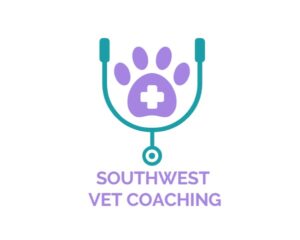
At Southwest Veterinary Coaching, we specialize in providing training and support to Registered Veterinary Technicians (RVTs) and other veterinary support staff who are looking to improve their skills when it comes to triaging and handling common emergencies. We understand that these situations can be stressful, which is why we are committed to helping our clients feel more comfortable and confident in their abilities.
Join us at Southwest Veterinary and learn the art of triaging. Our course delves deep into the 5 most common emergencies seen in regular general practices, providing different scenarios on how each staff role is managed through an emergency, starting with CSRs asking probing questions to owners about their sick pet. We’ll then move onto RVTs knowing how to stabilize patients, administer drug doses as per DVM, and identify normal vitals versus concerns. Our experienced instructors will share pearls of wisdom that will help you feel confident in your ability to handle emergencies in a professional and effective manner.
$750 up to 8 staff members
To register southwestvetcoaching@gmail.com

Training programs: Learn. Grow. Succeed.
COMMUNICATING WELL
1 CE CREDIT
The key to a team’s success is communication, so CDMV provides a training that will help you understand your team’s different personalities and how to integrate a variety of tools and improve communication at work.
Key concepts:
· Understanding emotional intelligence
· Personality assessment
· Effective communication
To learn more or to book a session with your Account Executive, please call 1 800-668-2368.
CLIENT SATISFACTION
1.5 CE CREDITS
Designed in collaboration with the American Animal Hospital Association (AAHA), this covers simple, easily-applicable and industry-specific marketing concepts.
It is increasingly difficult to exceed client expectations, especially in a fast-paced clinic environment. This training session outlines a 4-step process that can be easily used in clinics to better understand clients’ points of view and instill the best actions for maintaining healthy trust-based relationships with them.
Key concepts:
· Identify various types of interaction and how they impact the client-clinic relationship.
· Acknowledge the importance of getting client feedback about the practice and staff.
· Be responsive to client input and make the necessary changes.
To learn more or to book a session with your Account Executive, please call 1 800-668-2368.
CLIENT EDUCATION AND COMPLIANCE
1.5 CE CREDITS
Designed in collaboration with the American Animal Hospital Association (AAHA), this covers simple, easily-applicable and industry-specific marketing concepts.
This training session is designed to help veterinary teams to refine their recommendation making skills and aims to maximize clients’ compliance with recommendations.
Key concepts:
· Get to know your clients, earn their trust and establish a rapport.
· Use education and communication to foster better compliance.
· Stand out and make your clients feel special.
To learn more or to book a session with your Account Executive, please call 1 800-668-2368.
MESSAGE AND BRAND DEVELOPMENT
1.5 CE CREDITS
Designed in collaboration with the American Animal Hospital Association (AAHA), this covers simple, easily-applicable and industry-specific marketing concepts.
If your clients were to describe your clinic’s personality, what would they say? Would they be right? This training session is designed to help realize how clients view your reputation and adjust your image and message to meet your business objectives.
Key concepts:
· Understand the elements involved in the message you wish to convey.
· Learn marketing tips for dealing with challenges specific to veterinary circles.
· How to present the right image.
To learn more or to book a session with your Account Executive, please call 1 800-668-2368.
INVENTORY MANAGEMENT
1 CE CREDIT
Inventory is the second largest expense for veterinary clinics. It is also directly related to the quality of service delivery. With the S.M.A.R.T.E.R. approach, veterinary clinic teams will learn concrete skills on how to save time and reduce waste. Better inventory management frees up time to focus on what really matters: caring for animals.
Objectives:
· Structure the process for efficiency purposes
· Identify the key stages of the process
· Get concrete tools and tips for effective inventory management
To learn more or to book a session with your Account Executive, please call 1 800-668-2368.
Online Opportunities

Dermatopicals are often underused in managing veterinary dermatology patients. However, they can be an essential part of a multimodal treatment plan, aiding in the repair of the skin barrier, which is so often disrupted in patients with skin disease.
During this webcast, learn from veterinary dermatologist, Dr. Charlie Pye, as she discusses:
• barrier dysfunction in allergic patients;
• some of the barriers to implementing topical therapy;
• the benefits of topical therapy for dermatology patients.

This webcast will be available for on-demand viewing on our website: https://www.communivet.com/en/fa/education/webcasts/fluid-therapy-for-scouring-calves
Neonatal calf diarrhea (i.e., scours) is one of the predominant causes of calfhood disease, death, and reduced growth. While various pathogens may cause diarrhea, clinical symptoms and case fatality are largely associated with the ensuing dehydration rather than the diarrhea itself. As such, fluid therapy is the most important aspect of treatment, and the appropriate correction of dehydration and acid-base imbalances is critical for clinical success in scours cases. During this webcast, Dr. Claire Windeyer will refresh some principles of fluid therapy, including reviewing practical tools for in-clinic or on-farm rehydration of calves.

Presented by Dr. Susan Little
While we can’t say goodbye to insulin yet, new oral medications have revolutionized care for diabetic cats. During this webcast, Dr. Susan Little will focus on the advancements in treating feline diabetes mellitus. She will review a range of treatment options and discuss the best candidate patients for each one. It is important to understand the patient and the owner to determine the optimal course of treatment by discussing the spectrum of care.
Join us to enhance your knowledge and help improve patient outcomes.
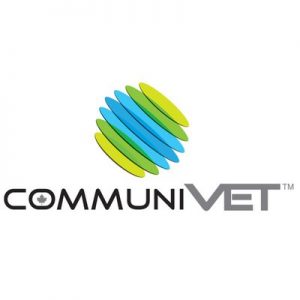
Presented by Dr. Linda Toresson
This presentation will provide a critically focused overview of gut microbiome composition and how it affects and is affected by host health and disease. It will discuss interpretation and misinterpretation of fecal tests to assess the intestinal microbiome and the built-in redundancy of the microbiome that allows continued functionality, despite minor shifts in microbial diversity. Other topics in this webinar will include how the gut microbiome plays a role beyond food digestion, such as in SCFA production, bile acid conversion, and dysbiosis as cause or effect of disease, as well as rational use of antibiotics.
https://www.communivet.com/en/ca/education/webcasts/assessing-and-treating-the-microbiome

1-hour on-demand webcast presented by Senani Ratnayake
It’s impossible to have a strategy when it comes to advocating for proper nutrition and making and reinforcing recommendations, without the basics. Part 1 will take you through why nutrition actually matters, and the impact it has for every pet. From there, we will discuss how to ensure a meaningful dialogue by systematically reviewing the pet’s current circumstances and identifying a strong starting point that will lead to a successful nutrition conversation. Why? Because it’s not just about “pet food,” it’s about a vital assessment that contributes to overall health and wellbeing.

On-demand webcast available as of October 18th, presented by Nicole Sheehan, DVM, CVA, CVCH, CVFT.
In this webcast, Dr. Sheehan will explore integrative approaches to managing kidney disease, emphasizing the importance of early detection in chronic kidney disease.
She will also present:
- Practical tips and tricks for treating kidney disease;
- Insights into what is missing in the traditional standard of care;
- Additional strategies to support kidney patients beyond prescription diets and fluid therapy.
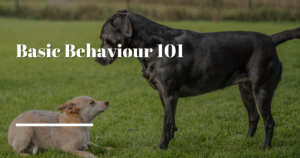
Canine Basic Behaviour 101
Safe, positive and healthy human to dog interactions start with learning to understand and speak their language. This 2.5-hour course has been designed to give Animal Professionals, Rescue Volunteers and dog owners the tools necessary to better read canine body language, correctly determine the animal’s emotional state, understand their needs, and recognize early warning signs of behavioural concerns. In addition to learning how to read canine body language, this course also reviews the distinct training needs of each breed group, and investigates least intrusive, minimally aversive, training techniques designed to satisfy the unique needs of the individual dog.
Topics that will be covered are:
How to read canine body language
Different breeds and their training needs
Human to canine communication
Positive training techniques
Suggested training supplies
The target audience for this course includes; Animal Control Officers, Canine Handlers, Veterinarian Technicians, Breeders, dog trainers & behavioural consultants, groomers, doggy daycare attendants, dog walkers / pet sitters, foster parents for canine rescue groups and the average dog owner.
Canine Foundations is proud to offer 2.5 OAVT (Ontario Association of Veterinary Technicians), 3.5 CCPDT (Certification Council for Professional Dog Trainers) and 4 IAABC (International Association of Animal Behavior Consultants) Continuing Education Credits for Behaviour 101.
Course length 2.5 hours
Cost: $68.25

This course is designed to teach professionals within the canine field, rescue workers and dog owners how to assess, manage and treat mild cases of dog-to-dog aggression. During the first half of the course participants will learn how to; identify and categorize the common types of dog aggression, isolate the dog’s motivation for the problematic behaviour, set realistic treatment goals and how to choose the best treatment and / or management option for that dog. The second half of the seminar delves into the technical aspect of applying strong management and various treatment techniques designed to rehabilitate the most common types of dog-to-dog aggression.
This seminar covers the following topics:
Assessing Dog-to-Dog Aggression
Aggression Management
Treatment Suggestions
Treatment Applications
Realistic Goal Setting
The target audience for this course includes; Animal Control Officers, Canine Handlers, Veterinarian Technicians, Breeders, dog trainers & behavioural consultants, groomers, doggy daycare attendants, dog walkers / pet sitters, foster parents for canine rescue groups and the average dog owner.
Canine Foundations is proud to offer 2.5 OAVT (Ontario Association of Veterinary Technicians), 3.5 CCPDT (Certification Council for Professional Dog Trainers) and 4 IAABC (International Association of Animal Behavior Consultants) Continuing Education Credits for Dog to Dog Aggression.
Cost: $68.25

When your dog is destroying your house, irritating the neighbours, or injuring themselves every time you leave the home, is it Separation Anxiety? How can you tell? Where can you turn for help? Separation disorders are one of the leading causes for owner frustration and if left untreated, these situations often escalate to an unbearable and even dangerous level. This course is designed to provide individuals who work and live with dogs the necessary information they require to; understand the difference between separation anxiety and separation frustration / boredom, determine which behavioural issues they are dealing with, the root cause for each disorder, how to address separation frustration / boredom, how to avoid creating separation anxiety in your dog and how to design a treatment program for mild to moderate cases of separation anxiety.
This seminar will delve into topics such as:
Separation Anxiety vs Frustration
The nature of attachment and separation
The truth about Frustration
Understanding Separation Anxiety
Treatment options for separation disorders
Preventative measures
The target audience for this course includes; Animal Control Officers, Canine Handlers, Veterinarian Technicians, Breeders, dog trainers & behavioural consultants, groomers, doggy daycare attendants, dog walkers / pet sitters, foster parents for canine rescue groups and the average dog owner.
Canine Foundations is proud to offer 2.5 OAVT (Ontario Association of Veterinary Technicians), 3.5 CCPDT (Certification Council for Professional Dog Trainers) and 4 IAABC (International Association of Animal Behavior Consultants) Continuing Education Credits for Behaviour 102.
Cost: $68.25

What is resource guarding? Is it treatable? Are all cases of resource guarding subject to behaviour modification? Resource guarding is characterized as an aggressive reaction towards a person and / or animal with the intent to protect a valued resource, such as food or toys, and one of the top 5 reasons owners choose to euthanize or surrender their dogs into the rescue system. Resource guarding reactions can range from mild, simply leaning over the item and refusing to give it up, to severe, disengaging from the item to attack the approaching individual. Identifying which type of guarding you are dealing with and isolating triggers is the first step but how do you know what cases are safe to work with and which techniques to apply?
In addition to learning how to identify resource guarding this course is designed to provide individuals who work and live with dogs the necessary information they require to determine the type of resource guarding present, isolate triggers, design rehabilitation programs and learn preventative techniques.
This seminar will delve into topics such as:
The nature of resource guarding
Assessing resource guarding & triggers
Evaluating rehabilitation risks
Realistic goal setting
Identifying types of resource guarding
Treatment suggestions
Designing treatment programs
Preventative measures
The target audience for this course includes; Animal Control Officers, Canine Handlers, Veterinarian Technicians, Breeders, dog trainers & behavioural consultants, groomers, doggy daycare attendants, dog walkers / pet sitters, foster parents for canine rescue groups and the average dog owner.
Canine Foundations is proud to offer 2.5 OAVT (Ontario Association of Veterinary Technicians), 3.5 CCPDT (Certification Council for Professional Dog Trainers) and 4 IAABC (International Association of Animal Behavior Consultants) Continuing Education Credits for Behaviour 103.
Cost: $68.25
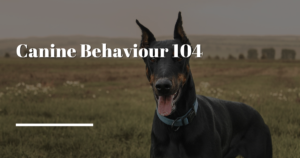
Territorial response behaviours run the gambit from obnoxious but harmless alert barking to full blown aggressive displays, including attack behaviours, leading to serious injuries. Through the process of domestication and selective breeding humans have attempted to control and strengthen these natural responses, leaving some breeds genetically predisposed to territorial behaviour. The question that remains is; are these dogs suited to urban and family environments and if so how do we work with the dog’s natural tendencies to reduce the risk of injury and legal liability?
The early signs of territorial behaviour in young dogs are often either dismissed or confused with a fear response. Misidentification can lead to the implementation of the wrong techniques and inadvertently promote the very behaviour the owner is trying to remove. This 4 hour course will teach you; where this behaviour comes from, how identify territorial behaviour and how to develop a management program best suited for the individual dog and their unique living situation.
Topics covered include:
The origins of territorial behaviour
Recognizing guarding behaviour patterns
Assessing territorial guarding & triggers
Evaluating rehabilitation risks
Realistic goal setting
Treatment suggestions
Designing treatment programs
In addition to learning how to identify territorial behaviour patterns this course is designed to provide individuals who work and live with dogs the necessary information they require to determine the type and level of territorial guarding present, identify early warning signs, preventative techniques, implement management techniques, design rehabilitation programs and learn the canine specific legislation governing canine to human interaction.
The target audience for this course includes; Animal Control Officers, Canine Handlers, Veterinarian Technicians, Breeders, dog trainers & behavioural consultants, groomers, doggy daycare attendants, dog walkers / pet sitters, foster parents for canine rescue groups and the average dog owner.
Canine Foundations is proud to offer 2.5 OAVT (Ontario Association of Veterinary Technicians), 3.5 CCPDT (Certification Council for Professional Dog Trainers) and 4 IAABC (International Association of Animal Behavior Consultants) Continuing Education Credits for Behaviour 104.
Cost $68.25

On-demand webcast with Dr.Kerstin Von Pückler
In this webinar, Dr Von Pückler discusses the role of diagnostic imaging in canine osteoarthritis: Discover the benefits of including a radiographic evaluation in osteoarthritis diagnosis rather than starting treatment based on clinical symptoms. Learn about the differences in radiographic appearance of early versus advanced osteoarthritis. Discover the radiographic signs to look for to diagnose predisposing arthropathies. Understand potential limitations of radiography and how to overcome those by using CT and MRI. Explore potential improvements in early osteoarthritis diagnoses.
Presented by Dr. Monteiro and Dr. Belshaw
In this webinar, Dr. Belshaw reveals the effects of canine osteoarthritis on the pet owner:
• Discover how canine osteoarthritis affects the owner and the owner–pet bond
• Learn about the variability in dog owner knowledge of canine osteoarthritis and how to address this
• Discover the fears and concerns of owners following a diagnosis of canine osteoarthritis
• Learn what owners expect good osteoarthritis management to achieve
• Understand how to use this information to improve clinical outcomes and owner satisfaction

On-demand webcast with Dr. Bryan Torres.
In this webcast, Dr. Bryan Torres discusses the benefits of a multidisciplinary approach to canine osteoarthritis management.
Part 1: Multimodal Pain Management
Osteoarthritis is a complex condition characterized by joint pain, functional limitations, and a reduced quality of life. Dr. Torres explores how multimodal pain management, delivered by a multidisciplinary team, can improve outcomes for dogs living with osteoarthritis.
Part 2: Multidisciplinary Team
Dr. Torres outlines the roles and contributions of a multidisciplinary team in effectively addressing the various aspects of osteoarthritis care.

https://www.communivet.com/en/ca/education/webcasts/the-primary-care-perspective
Presented by Dr. Beatriz Monteiro and Dr. Hannah Capon
In this webinar, Dr Capon provides great insights and tips for primary care clinics in managing canine osteoarthritis:
• Learn how to establish fruitful communication with owners of osteoarthritic dogs
• Understand how to deal with misconceptions about canine osteoarthritis
• Discover how to empower owners in a collaborative approach to canine osteoarthritis
• Find out how and why to involve all clinic staff in osteoarthritis management
• Learn how to keep owners motivated to improve long-term outcomes for their pet
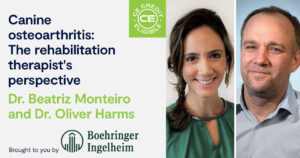
Canine osteoarthritis: The rehabilitation therapist’s perspective presented by Dr. Monteiro and Dr. Harms starting March 1, 2024.
This webcast is presented as part of our series on canine osteoarthritis addressing pathogenesis, disease awareness, canine and owner quality of life, and osteoarthritis management, including new developments.
In this webcast, Dr. Oliver Harms provides great insights on how to improve mobility and activity in dogs with osteoarthritis (OA) thanks to physiotherapy.
• Learn how physiotherapy can be combined with all treatment modalities in all stages of OA as part of a multimodal treatment protocol.
• Understand why physiotherapy treatment should be individualized for each dog and its owner.
• Discover why effective communication between owners and the veterinary team is paramount.
• Learn how passive range of motion are simple and effective exercises that pet owners can easily apply at home.
• Learn about various home-based and specialized treatments that can improve mobility function of dogs with OA – contributing to improved quality of life and animal welfare.
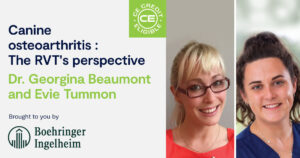
This webcast is presented as part of our series on canine osteoarthritis addressing pathogenesis, disease awareness, canine and owner quality of life, and osteoarthritis management, including new developments.
In this webcast, Dr. Georgina Beaumont and Evie Tummon, RVT, provide comprehensive up-to-date education on various aspects of canine osteoarthritis (OA) from a new perspective.
• Learn about the RVT’s pivotal role in empowering owners to manage osteoarthritic pets
• Understand how RVTs provide mentorship to owners, supporting positive outcomes for pets
• Discover the tools that help with training, and provide structure to RVT osteoarthritis appointments
• Find out how information packs supplement the guidance given by RVTs during appointments
• Learn how RVT appointments provide owners with continuity of care when tackling osteoarthritis

Presented by Dr. Marie Holowaychuk
Sleep is one of the most underrated strategies for mental and physical health and well-being. Research demonstrates that adults who consistently get less than six hours of sleep per night are predisposed to many health problems. Unfortunately, more than 30% of people experience insomnia and with the constant pull of work and technology, getting a good night’s sleep is increasingly challenging.
During this webcast, veterinary wellness advocate and Thrive! collaborator, Dr. Marie Holowaychuk will discuss the sleep cycle, explore the causes of insomnia, and provide practical tools to improve sleep. After this session, you will:
- Know recent statistics regarding sleep deficits and health challenges;
- Understand the sleep cycle and circadian rhythm;
- Use strategies for insomnia management and enhancing sleep hygiene.
It’s easy to say, “We should check the blood pressure of every senior and geriatric cat that comes into the clinic.” Still, when faced with the reality of handling cats (and their cattitude), the innate malice of machines (are the readings even accurate?), and the challenges of owner compliance, our own blood pressure can rise as we try to manage theirs. In this webcast, feline specialist Dr. Elizabeth Ruelle will focus on a very realistic approach to managing blood pressure in her patients. She will provide an overview of pathophysiology of hypertension, the clinical signs that caregivers might observe, the stumbling blocks we need to work around, and current treatment considerations.

Comprehensive clinic training includes three online modules with quizzes, custom templates for compassionate email correspondence, recommendations for instantly transforming your exam room into a cozy grieving room, and a list of excellent grieving resources for families. Our e-learning courses are offered on-demand so your team can learn at their own pace.
Module 1 (OAVT Category 1 – 1.5 credits)
Helping Families Know When It’s Time
One of the biggest struggles a family has as their beloved pet approaches the end of their life is knowing when it’s time to say goodbye. It’s up to the veterinary team to empower families with the knowledge and resources they need to be able to monitor their pets comfort and overall quality-of-life. During this module we will discuss the following:
- What are the components of an excellent quality-of-life assessment.
– Review effective quality-of-life scales.
– Discover the importance of having a family track their pets good days and bad days on a calendar.
– Chronic pain scales and helping families use one.
– The importance of quality of life over quantity of time.
– Having families create a bucket list
– Helpful resources for a grieving family
Module 2
Creating a Meaningful End of Life Care Experience (OAVT Category 1 – 1.5 credits)
Families now have higher expectations than ever for their pet’s end-of-life care experience. During this module team members will discover modern sedation protocols that allow for MUZZLE-FREE sedation for all patients. Your team will be prepared to gracefully navigate any and all challenges that arise during end-of-life care, ensuring that families have a meaningful experience. The Navigating End-of-Life Care Challenges course covers the following subjects:
- Discovering the difference profound sedation makes for the patient, family, and care provider.
– Basic sedation protocols for End-of-Life Care.
– Learning when to deviate from standard protocols.
– Effective oral sedation options.
– Learning when to involve the family.
– Discovering how to achieve muzzle-free sedation for all patients.
– Tips and tricks for distracting patients for sedation.
– What to do when you can’t secure a vein.
– Common reasons a patient won’t fall asleep and what to do.
– Seizures: what to do when a patient has a seizure and how to reassure the family.
– Aggressive patients
– Respiratory distress, patient handling, and family education.
– Edema in the limbs.
– Reassuring the nervous family.
– Handling an angry family member.
Module 3
The Team Approach to End-of-Life Care (OAVT Category 3 – 1.25 credits)
A great end-of-life care experience requires team effort! Gone are the days when a family has a half-hearted greeting from a busy staff member and then waits in the reception area for their pet’s end-of-life care. Families are demanding more, and we are here to help. This course outlines the importance of a team approach and teaches students easy-to-implement techniques for creating a warm and compassionate experience. Your team will learn that a meaningful death starts when the family makes the dreaded “call” and builds from there. Your team will examine why the responsibility falls on every team member to ensure that the worst day of a pet owner’s life is just a little bit easier.
The Team Approach to End-of-Life Care course covers the following subjects:
- Why compassionate communication should be a team effort.
- Why paperwork and payment should be done ahead of time.
- Strategic booking for end-of-life care.
- The role our team members play in a good death.
- Why every team member matters.
- The importance of having a sign.
- Don’t make them wait.
- The importance of offering privacy.
- Why less is more.
Cost: $399 for 2 team members and $75 per additional team member
https://www.theartofgoodbye.ca/our-services/veterinary-clinic-courses

Did you know that RVTs in Ontario are allowed to provide end-of-life care to patients under the indirect supervision of a veterinarian?
As the world’s first comprehensive end-of-life care training program designed specifically for Registered Veterinary Technicians, it is not only transforming end-of-life care but also helping to shape the future of veterinary medicine. Our comprehensive end-of-life care training program was designed to elevate the knowledge and skill set of Registered Veterinary Technicians, empowering them to create a meaningful end of life care experience that honours the bond the family has shared.
Our course consists of six modules and assignments along with helpful templates and world class resources ensuring the highest standard of care.
1) Introduction To End-of-Life Care (OAVT Category 3 – 1 credit)
– Review how the human animal bond has evolved over the centuries.
– Discuss modern expectations that families have for their pet’s end-of-life care.
– Learn the steps to creating a meaningful experience.
– Touch on ways to support our own emotional well-being.
– Learn what burden transfer is and how to help avoid it.
– Review the factors that lead to a family’s end-of-life care decision.
2) The Unique Challenges Faced by RVTs Providing End-of-Life Care (OAVT Category 3 – 1 credit)
– Discuss the importance of following guidelines surrounding supervision and delegation.
– Discuss tips for building the DVM’s confidence in your ability to perform end-of-life care.
– Develop a plan to ensure the family has confidence in your abilities.
– Learn how to answer the question “Are you a Vet?”
– Review things about end-of-life care you didn’t learn in school.
– Discover the importance of having the DVM create thorough protocols outlining when and how to deviate from the sedation protocol
3) Compassionate Communication Strategies (OAVT Category 3 – 1.25 credits)
– Learn how judging a family’s decision for End-of-Life Care creates communication barriers and increases our risk for burden transfer and burnout.
– Develop an understanding of how to convey compassion as you communicate with a grieving family.
– Learn about phone and email communication etiquette surrounding End-of-Life Care
– Learn the dos and don’ts of End-of-Life Care Communication
– Explore the role body language plays in EOL Care communication and learn the dos and don’ts of body language
– Develop strategies for navigating End-of-Life Care communication challenges
4) Navigating End-of-Life Care Challenges (OAVT Category 1 – 1.5 credits)
– Discovering the difference profound sedation makes for the patient, family, and care provider.
– Examples of sedation protocols for end-of-life care.
– Learning common reasons you may have to deviate from standard protocols.
– Effective oral sedation options.
– Learning when to involve the family.
– Discovering how to achieve muzzle-free sedation for all patients.
– Tips and tricks for distracting patients for sedation.
– What to do when you can’t secure a vein.
– Common reasons a patient won’t fall asleep and what to do.
– Seizures: what to do when a patient has a seizure and how to reassure the family.
– Handling aggressive patients you weren’t prepared for.
– Respiratory distress, patient handling, and family education.
– Edema in the limbs.
– Reassuring the nervous family.
– Handling an angry family member.
5) Optimizing your End-of-Life Care Kit (OAVT Category 1 – 1 credit)
– Things to consider when picking a bag/kit.
– Basic supplies you can’t do without.
– How to pre-make intra-organ injection kits.
– Supplies that you’ll want extras of.
– Additional resources to keep in your bag/kit.
6) Helping Families Know When it’s Time (OAVT Category 1 – 1.5 credits)
– What is a quality of life assessment.
– Learn how to use quality of life scales.
– Discover the importance of having a family track their pet’s good days and bad days on a calendar.
– Helping families use a pain scale.
– The importance of quality over quantity.
– Creating a bucket list
– Helpful resources for a grieving family
Cost: $499
https://www.theartofgoodbye.ca/our-services/e-learning-courses

Presented by Dr. Marie Holowaychuk
A sense of belonging is one of the strongest predictors of wellbeing and lower burnout among veterinary professionals. That’s why Diversity, Equity, Inclusion, and Belonging (DEIB) are not just buzzwords—they are essential for building a supportive, thriving workplace culture.
During this webcast, veterinary wellness advocate and Thrive! collaborator, Dr. Marie Holowaychuk will discuss practical strategies to cultivate a culture where every team member feels valued and empowered. She will also discuss concrete steps that individuals, leaders, and teams can take to ensure everyone has a voice, reduce bias, and build a sense of connection within the workplace.

Discover the latest advancements in managing bacterial resistance in veterinary care. In this webcast, Dr. Anthony Yu will review the mechanisms and concerns regarding the emergence of Methicillin-resistant Staphylococcus biocide resistance to some of our trusted topical therapies such as chlorhexidine, mupirocin, and fucidin. He will also examine the attributes of MICROSILVER+ SHAMPOO as a topical alternative to treating secondary infections without resistance concerns and evaluate its anti-inflammatory properties in helping to alleviate allergic inflammation.

Dairy cows are increasingly being dried off at higher milk production levels, raising concerns about their health and welfare during the dry period. This elevated production can result in problems such as udder engorgement and milk leakage, thereby increasing the risk of new clinical mastitis cases as cows transition into the dry-off phase.
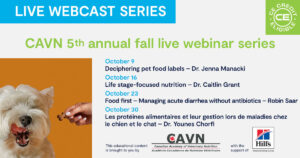
Presented by Jenna Manacki, DVM, residency-trained in clinical nutrition
- Review of pet food labels, including their essential components, current pet food regulations in Canada, and anticipated changes in pet food label design
- Objective assessment of pet foods, highlighting what information can and cannot be found on labels
